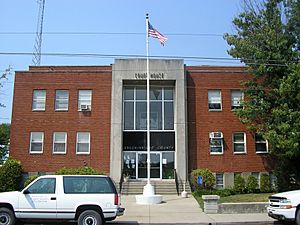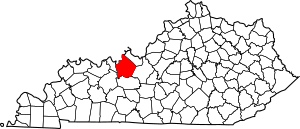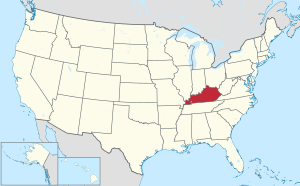Breckinridge County, Kentucky facts for kids
Quick facts for kids
Breckinridge County
|
|||
|---|---|---|---|

Breckinridge County, Kentucky courthouse in Hardinsburg
|
|||
|
|||

Location within the U.S. state of Kentucky
|
|||
 Kentucky's location within the U.S. |
|||
| Country | |||
| State | |||
| Founded | 1799 | ||
| Named for | John Breckinridge | ||
| Seat | Hardinsburg | ||
| Largest city | Hardinsburg | ||
| Area | |||
| • Total | 586 sq mi (1,520 km2) | ||
| • Land | 567 sq mi (1,470 km2) | ||
| • Water | 18 sq mi (50 km2) 3.2%% | ||
| Population
(2020)
|
|||
| • Total | 20,432 | ||
| • Estimate
(2023)
|
21,124 |
||
| • Density | 34.867/sq mi (13.462/km2) | ||
| Time zone | UTC−6 (Central) | ||
| • Summer (DST) | UTC−5 (CDT) | ||
| Congressional district | 2nd | ||
Breckinridge County is a county located in the Commonwealth of Kentucky. As of the 2020 census, the population was 20,432. Its county seat is Hardinsburg, Kentucky. The county was named for John Breckinridge (1760–1806), a Kentucky Attorney General, state legislator, United States Senator, and United States Attorney General. It was the 38th Kentucky county in order of formation. Breckinridge County is now a wet county, following a local-option election on January 29, 2013, but it had been a dry county for the previous 105 years.
Contents
History
In August 1779, Sinclair Hardin (first cousin of Captain William Hardin, the founder of Hardin's Fort), was killed by Shawnee Indians while taking at drink at Big Springs. He was the first white settler in Breckinridge County to be killed by Native Americans. The Indian threat remained for the settlers for some years after that. However, the only sizable expedition against the Native Americans that Breckenridge County settlers took part in culminated in the Battle of Saline Creek in August 1786. Fought in Illinois, the battle lasted only about four minutes, but was fiercely fought in hand-to-hand combat. Between 18 and 30 Shawnee warriors were killed, with six more wounded. The remainder of the Shawnee fled. Captain William Hardin had commanded the white volunteers, many of whom also were killed or wounded. Hardin's victorious militia took home 16 Shawnee scalps, nine captured horses, 17 muskets, and "a mighty nice sword".
Breckinridge County was established in 1799 from land formerly in Hardin County. It was the 38th Kentucky county in order of formation.
The Judge-Executive of Breckinridge County from 1801 to 1805 was William Comstock. Jo Allen was the county clerk, and Ben Huff was the sheriff.
When Abraham Lincoln's father, Thomas Lincoln, moved from the Knob Creek Farm, his last Kentucky home, shortly after November 11, 1816, he traveled through Breckinridge County, working odd jobs for several weeks. Thomas Lincoln took his wife, son, and daughter from the Knob Creek Farm (Abraham Lincoln's birthplace; in present-day Hodgenville) down the trail of the old Springfield Pike to Elizabethtown. After a short visit with the Brumfield family, the Lincolns traveled about twelve miles west, passing the First Regular Baptist Church of Mill Creek. The Lincolns followed the old pioneer trail (established in 1802) through Vine Grove (Viney Grove), and after crossing Otter Creek, they traveled through what is now the community of Flaherty (Breckinridge County) to the town of Big Spring. Their journey from Flaherty passed the Woolfork brick house at Jackey's Grove, then on to Big Spring. Big Spring is located where the boundaries of Hardin, Meade (established 1823), and Breckinridge counties meet. The Lincolns next passed Hopkins Otey Wale's farm in the area between Harned and Garfield in Breckinridge County, which until the Civil War, was known as the Prince of Wales. Mr. Wales owned about 2,000 acres of land on both sides of U.S. Route 60, and was centered about where "Dead Man's Curve" is now. Thomas Lincoln, at the time, was almost destitute. They spent the night at the inn, for which Mr. Lincoln paid his way by splitting wood. At that time, little Abe was only 7 or 8 years old. .....
The Lincolns followed the trace of the old pioneer Salt Lick Trail through Vine Grove, Flaherty, and Big Spring to U.S. Route 60 near Harned's Station. The Lincolns followed the most direct route by way of the Lost Run Road to Harned, and from Harned, the Lincoln family pursued a straight course over what is now Federal Highway 60 to the town of Hardinsburg. Colonel David R. Murray was the first person in Breckinridge County who came in contact with Thomas Lincoln's family as they migrated westward in their ox-cart. Colonel Murray talked to the Lincolns in person, and being well informed concerning the surrounding country, he directed them to a vacant log cabin, where they might secure rest and shelter. Murray's old colored female servant, Minerva, after seeing the condition of the children, went back into the house, and came back immediately with a plate heaped with slices of homemade bread covered with butter, a pitcher of milk, and some cups. She seated the children on the steps of Murray's house and fed the Lincoln children.
Thomas Lincoln and his family spent two or three weeks in Hardinsburg and occupied a small cabin near the southern edge of town, what is now the Kentucky FFA Leadership Training Camp in Hardinsburg. Local residents gave them food and a cow for milk. From Hardinsburg, the Lincoln family took the Yellow Banks Road to Cloversport. In Cloversport (then Joesville, named after Joe Huston), Thomas Lincoln, Nancy, Sarah, and, 7 or 8-year-old Abraham Lincoln spent one night in the home of Mrs. Kittie Monroe's father in Cloverport above Clover Creek. Mrs. Kittie Monroe was the wife of James Monroe.
The Lincolns left Kentucky by crossing the Ohio River at Cloverport on a log ferry operated by Jacob Weatherholt, from above the mouth of Clover Creek, through Thompson's Ferry, which operated on the Ohio River in the vicinity of the mouth of Anderson Creek, to Tobinsport, Indiana. The next day, the Lincoln family made their way down to Rock Island (Indiana), and camped at "Lafayette Springs", named so because that is where the Mechanic, the steamboat Marquis de Lafayette was on, wrecked on May 8–9, 1825. The next day (December 1816), the Lincoln family stopped at Troy, and then moved on toward their new home to take up a Federal Land Claim near Little Pigeon Creek (within the Little Pigeon Creek Community) in what was then Perry County and is now Spencer County, Indiana.
During the American Civil War, Confederate cavalry burned the local courthouse, which was being used by Union troops as a barracks, but most of the records were saved. On March 12, 1865, Jerome Clarke, a notorious Confederate guerrilla, reputed by some to have been Sue Munday, was captured near the Breckinridge–Meade County line and was hanged three days later in Louisville. Afterward, his trial drew heavy criticism.
During the nineteenth century, the Victoria Coal Mines, named in honor of Queen Victoria of the United Kingdom, were the first to produce coal oil, and Cloverport exported coal oil to Great Britain, where it was used to light Buckingham Palace.
United States Supreme Court Justice Wiley Blount Rutledge, Jr., who served on the High Court from 1943 to 1949, was born at Tar Springs in 1894, while his father was pastor of Cloverport Baptist Church.
On June 6, 1932, at Hardinsburg, Sam Jennings became the second-last person to be publicly executed in the United States.
In the 1950s Rough River Dam State Resort Park was developed at the southern border of the county.
A third courthouse fire nearly destroyed county records in 1958.
Breckinridge County High School prides itself as the champion of the 1965 and 1995 Kentucky High School Athletic Association's Boys' Basketball tournaments.
The Breckinridge County Archives, formed in 1984, was the first state-funded archival repository in the history of the United States and is known across the nation as an excellent resource for genealogical and historical research.
Geography
According to the U.S. Census Bureau, the county has a total area of 586 square miles (1,520 km2), of which 567 square miles (1,470 km2) is land and 18 square miles (47 km2) (3.2%) is water.
Adjacent counties
- Perry County, Indiana (northwest)
- Meade County (northeast/EST Border)
- Hardin County (east/EST Border)
- Grayson County (south)
- Ohio County (southwest)
- Hancock County (west)
Demographics
| Historical population | |||
|---|---|---|---|
| Census | Pop. | %± | |
| 1810 | 3,430 | — | |
| 1820 | 7,485 | 118.2% | |
| 1830 | 7,345 | −1.9% | |
| 1840 | 8,944 | 21.8% | |
| 1850 | 10,593 | 18.4% | |
| 1860 | 13,236 | 25.0% | |
| 1870 | 13,440 | 1.5% | |
| 1880 | 17,486 | 30.1% | |
| 1890 | 21,034 | 20.3% | |
| 1900 | 20,534 | −2.4% | |
| 1910 | 21,034 | 2.4% | |
| 1920 | 19,652 | −6.6% | |
| 1930 | 17,368 | −11.6% | |
| 1940 | 17,744 | 2.2% | |
| 1950 | 15,528 | −12.5% | |
| 1960 | 14,734 | −5.1% | |
| 1970 | 14,789 | 0.4% | |
| 1980 | 16,861 | 14.0% | |
| 1990 | 16,312 | −3.3% | |
| 2000 | 18,648 | 14.3% | |
| 2010 | 20,059 | 7.6% | |
| 2020 | 20,432 | 1.9% | |
| 2023 (est.) | 21,124 | 5.3% | |
| U.S. Decennial Census 1790-1960 1900-1990 1990-2000 2010-2020 |
|||
As of the census of 2000, there were 18,648 people, 7,324 households, and 5,309 families residing in the county. The population density was 33 per square mile (13/km2). There were 9,890 housing units at an average density of 17 per square mile (6.6/km2). The racial makeup of the county was 95.84% White, 2.86% Black or African American, 0.23% Native American, 0.08% Asian, 0.02% Pacific Islander, 0.09% from other races, and 0.90% from two or more races. 0.72% of the population were Hispanic or Latino of any race.
There were 7,324 households, out of which 31.00% had children under the age of 18 living with them, 59.60% were married couples living together, 8.90% had a female householder with no husband present, and 27.50% were non-families. 24.60% of all households were made up of individuals, and 11.60% had someone living alone who was 65 years of age or older. The average household size was 2.51 and the average family size was 2.97.
In the county, the population was spread out, with 24.90% under the age of 18, 8.20% from 18 to 24, 26.70% from 25 to 44, 26.00% from 45 to 64, and 14.20% who were 65 years of age or older. The median age was 38 years. For every 100 females there were 98.60 males. For every 100 females age 18 and over, there were 96.30 males.
The median income for a household in the county was $30,554, and the median income for a family was $36,575. Males had a median income of $31,004 versus $19,371 for females. The per capita income for the county was $15,402. About 11.80% of families and 15.80% of the population were below the poverty line, including 16.60% of those under age 18 and 19.00% of those age 65 or over.
Education
K-12 education
School districts include:
- Breckinridge County School District
- Cloverport Independent School District
It also has a private school:
- Saint Romuald Interparochial School
Library
Breckinridge County Public Library is located at 308 Old Highway 60 in Hardinsburg, Kentucky.
Higher education
A Roman Catholic seminary school operated in the Mount Merino community from 1838 to 1843. Founded by brothers Drs. Benedict and Richard Wathen, Mount Merino Seminary would today be considered a high school. It closed when its director, Fr. B.J. Spalding, was transferred.
A Methodist college operated in the Kingswood community from 1906 to 1934. Founded by John Wesley Hughes, Kingswood College closed during the Great Depression.
Communities
Notable natives
| Name | Achievements |
|---|---|
| Alfred "Butch" Beard | professional basketball player and coach |
| David "Big Dave" DeJernett | professional basketball player |
| Philip Leget Edwards | American educator |
| Joseph Holt | Judge Advocate General of the United States Army |
| Attorney General | |
| Secretary of War | |
| Commissioner of Patents | |
| Postmaster General | |
| Bobbi Jordan | American actress |
| John Alexander McClernand | Union General during the American Civil War |
| Charles Harwood Moorman | Judge of the Kentucky Court of Appeals,, and |
| Judge of the United States District Court for the Western District of Kentucky | |
| Judge of the United States Court of Appeals for the Sixth Circuit | |
| Wiley Blount Rutledge | Justice of the Supreme Court of the United States |
| George W. Swink | businessman |
| Joe Wright | Majority floor leader in the Kentucky State Senate |
See also
 In Spanish: Condado de Breckinridge para niños
In Spanish: Condado de Breckinridge para niños



